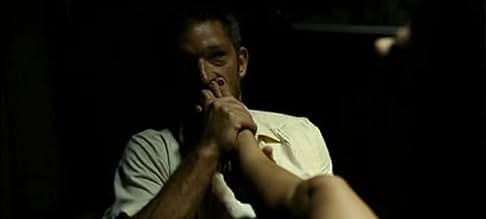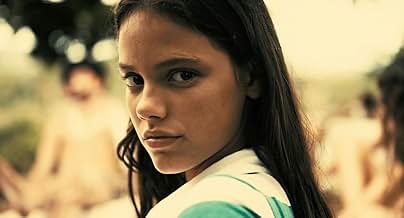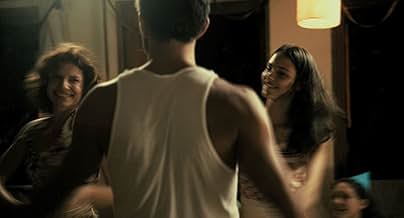CALIFICACIÓN DE IMDb
6.7/10
3.1 k
TU CALIFICACIÓN
Un drama ambientado en los años 80 sobre una adolescente que experimenta su despertar sexual cuando se entera de las infidelidades de su padre.Un drama ambientado en los años 80 sobre una adolescente que experimenta su despertar sexual cuando se entera de las infidelidades de su padre.Un drama ambientado en los años 80 sobre una adolescente que experimenta su despertar sexual cuando se entera de las infidelidades de su padre.
- Premios
- 8 premios ganados y 24 nominaciones en total
- Dirección
- Guionistas
- Todo el elenco y el equipo
- Producción, taquilla y más en IMDbPro
Opiniones destacadas
A very beautiful story, executed perfectly. The beach, the landscape evrything was so beautiful.
The actors were good too.
In The movie, the daughter(Filipa) handled the situation like a boss. And Camilla Belle was a good supporting role.
Overall a very good movie. I recommend watching it.
The actors were good too.
In The movie, the daughter(Filipa) handled the situation like a boss. And Camilla Belle was a good supporting role.
Overall a very good movie. I recommend watching it.
This is a coming of age story. Filipa is fourteen years old and dealing with the usual issues of a teen: sexuality, social acceptance, and self identity.
At the same time, her parents' relationship is crumbling under the weight of a real crisis.
All children confront the reality of their parents' imperfection at some point. Up till now, Filipa has seen her mother and (especially) her father through the eyes of an adoring child. She has to dispense with the childish viewpoint and confront reality, as she perceives it, just as the family's foundation is threatened. She feels her world crumbling around her as she realizes that she never really understood the real foundation of the family. In the end, she is adrift without any direction or understanding.
The resolution of this story is an imperfect one, with all involved parties grasping for the little pieces of happiness that can be salvaged. It is a realistic ending to a real-world story.
This story is about love, in all its forms--familial, romantic, platonic. It is love that sets them all adrift and love that provides whatever solace can be found.
At the same time, her parents' relationship is crumbling under the weight of a real crisis.
All children confront the reality of their parents' imperfection at some point. Up till now, Filipa has seen her mother and (especially) her father through the eyes of an adoring child. She has to dispense with the childish viewpoint and confront reality, as she perceives it, just as the family's foundation is threatened. She feels her world crumbling around her as she realizes that she never really understood the real foundation of the family. In the end, she is adrift without any direction or understanding.
The resolution of this story is an imperfect one, with all involved parties grasping for the little pieces of happiness that can be salvaged. It is a realistic ending to a real-world story.
This story is about love, in all its forms--familial, romantic, platonic. It is love that sets them all adrift and love that provides whatever solace can be found.
In the 80's, the fourteen year-old Filipa (Laura Neiva) is spending vacations in Búzios with her father, the French writer Mathias (Vincent Cassel), her alcoholic mother Clarice (Débora Bloch) and her two younger siblings in their beach house. When Filipa feels that the relationship of her parents is deteriorating, she snoops in her father's office and finds pictures of Mathias with his American lover Ângela (Camilla Belle) hidden in a drawer of his desk. When Mathias and Clarice announce to their children that they are not going to live together for a period, the confused Filipa believes that Ângela is the responsible for the separation of her parents and discovers that the marriage of Mathias and Clarice is built of lies.
"À Deriva" is the story of Filipa, who is very close to her father in an evident Oedipus Complex, in a moment when her family is falling apart and she feels completely lost in coming of age. The story is very realistic and well acted, and it is impressive how Vincent Cassel, who loves Brazil, speaks a fluent Portuguese. The participation of Camilla Belle, who also speaks a fluent Portuguese, is limited to a few scenes and lines. Unfortunately the subplots are silly and the running time of 97 minutes is excessive for the short drama. Further, the beautiful music score is too repetitive and boring in the end and sometimes so loud that is hard to understand the dialogs. My vote is six.
Title (Brazil): "À Deriva" ("Adrift")
"À Deriva" is the story of Filipa, who is very close to her father in an evident Oedipus Complex, in a moment when her family is falling apart and she feels completely lost in coming of age. The story is very realistic and well acted, and it is impressive how Vincent Cassel, who loves Brazil, speaks a fluent Portuguese. The participation of Camilla Belle, who also speaks a fluent Portuguese, is limited to a few scenes and lines. Unfortunately the subplots are silly and the running time of 97 minutes is excessive for the short drama. Further, the beautiful music score is too repetitive and boring in the end and sometimes so loud that is hard to understand the dialogs. My vote is six.
Title (Brazil): "À Deriva" ("Adrift")
ADRIFT (À Deriva) is a reflection of the eponymous certain summer every young teenager experiences. By setting this story of discovery - of parental flaws and infidelities as well as the coming into flower sexually - in the 1980s, before cellphones and emotional isolation crept into our lives, and by placing it in the idyllic setting of the exotic Brazilian seaside, writer/director Heitor Dhalia avoids the gimmicks and interruptions upon which we all new rely and instead allows the story to unfold as a personal journey as seen form the eyes of a fourteen-year old youth. It is a quite miracle of a film.
Famous author Matthias (Vincent Cassel) has brought his family from São Paulo for a summer vacation: his beautiful, alcoholic, frustrated wife Clarice (Débora Bloch), his young son Antônio (Max Huzar), his middle daughter Fernanda (Izadora Armelin), and his fourteen- year-old daughter Filipa (Laura Neiva). The interaction with Matthias and his children is warm and sincere but there seems to be a stress between Matthias and Clarice. The children spend their days at the beach where Filipa begins to recognize the onset of her coming of age when young Artur (Daniel Passi) comes on to her. Filipa is anxious about the onset of femininity and wonders about the perceived friction between her parents. She discovers evidence of her father's affair with an American tourist Ângela (Camilla Belle) living at the beach and spies on the couple in their clandestine meetings. In response she pays more attention to Artur and to a handsome bartender (Cauã Reymond) whom she has discovered having an assignation with Ângela. When Matthias and Clarice finally confront their children about the real reason for the summer vacation from São Paulo and their intention to separate, Filipa realizes that her parents' marriage is a mutual sham and finds her own way of escaping the realities she has discovered: she is left adrift on the sea of Life and must find her own choices of how to face her femininity, her concepts of relationships, and fragility of fidelity.
In Heitor Dhalia sure hands this film is a tender pleasure to watch: making the focus of the story center on the relationship between Mathias and his daughter Filipa he allows us to understand the various aspects of the fragmenting family. None of this could happen were it not for the meticulously perfect performances by the entire cast - with special emphasis on Vincent Cassel and Laura Neiva and Débora Bloch. The cinematography by Ricardo Della Rosa sensitively uses the water supporting bodies as a visual metaphor, from above and from below the surface just as the film reveals the obvious and occult aspects of a failing marriage. The film is in Portuguese with English subtitles.
Grady Harp
Famous author Matthias (Vincent Cassel) has brought his family from São Paulo for a summer vacation: his beautiful, alcoholic, frustrated wife Clarice (Débora Bloch), his young son Antônio (Max Huzar), his middle daughter Fernanda (Izadora Armelin), and his fourteen- year-old daughter Filipa (Laura Neiva). The interaction with Matthias and his children is warm and sincere but there seems to be a stress between Matthias and Clarice. The children spend their days at the beach where Filipa begins to recognize the onset of her coming of age when young Artur (Daniel Passi) comes on to her. Filipa is anxious about the onset of femininity and wonders about the perceived friction between her parents. She discovers evidence of her father's affair with an American tourist Ângela (Camilla Belle) living at the beach and spies on the couple in their clandestine meetings. In response she pays more attention to Artur and to a handsome bartender (Cauã Reymond) whom she has discovered having an assignation with Ângela. When Matthias and Clarice finally confront their children about the real reason for the summer vacation from São Paulo and their intention to separate, Filipa realizes that her parents' marriage is a mutual sham and finds her own way of escaping the realities she has discovered: she is left adrift on the sea of Life and must find her own choices of how to face her femininity, her concepts of relationships, and fragility of fidelity.
In Heitor Dhalia sure hands this film is a tender pleasure to watch: making the focus of the story center on the relationship between Mathias and his daughter Filipa he allows us to understand the various aspects of the fragmenting family. None of this could happen were it not for the meticulously perfect performances by the entire cast - with special emphasis on Vincent Cassel and Laura Neiva and Débora Bloch. The cinematography by Ricardo Della Rosa sensitively uses the water supporting bodies as a visual metaphor, from above and from below the surface just as the film reveals the obvious and occult aspects of a failing marriage. The film is in Portuguese with English subtitles.
Grady Harp
The Sao Paulo writer Mathias (Vincent Cassel) and his wife Clarice (Débora Bloch) are at their beach house in the coastal town of Buzios for the summer. They spend their days living a bohemian life with their friends, their three children and the rest of the young rat-pack from the beach. Their beautiful eldest daughter Filipa (Laura Neiva) is coming of age, although sitting on her fathers lap she is slowly but surely discovering her femininity. However the spring time of her youth sees not only the pitfalls of young love, but also a growing rift between her parents, and the threat of a disintegrating home.
A Deriva is a pleasure to watch, despite a simple storyline. It hinges on the relationship between Mathias and his daughter Filipa, as the film's warm focal point of the fragmenting family. Their roles are well worked out in these trying times. Mathias, and his wife Clarise, wisely protect their children from exposure of their marital rifts, but naturally the children - and specifically the eldest- feel the overshadowing conjugal burst.
What is perhaps the most remarkable, is how the same story filmed through the eyes of another culture, would have been so different. There are two elements at play here: a romanticized Brazil and the time frame. By placing the story in Brazil, we are taken into a joyful carefree Latin world of beaches, beautiful people, love and dance. By placing the story in the 1980s, were see a reality as if it was recalled by a much older Filipa looking back. It is a reality without a technology-inspired stress and superficiality, with a seeming authenticity of life orientated around physical people, living in homes filled with curiosity relics, without made-in-China goods and television-mimicking sentiments. It is a vision which justifies a perhaps kinder look at reality.
For everyone who is wondering how French top actor Vincent Cassel found himself in a small Brazilian production – Cassel is a frequent visitor of Bahia, the African-influenced state in the tropical north. He speaks Portuguese fluently, but as all attentive viewers will notice, it is not his (slightly off) accent which puts him in a curious position in the film – his role does not get lines as credible as those which the other characters get. Mathias' character, and hence the film, is saved by Cassel's acting talent. But then the movie was destined to float or sink on Cassel and Laura Neiva's capacity to convey the sensual lightness of living anyway. And that, they pull of masterfully.
A Deriva is a pleasure to watch, despite a simple storyline. It hinges on the relationship between Mathias and his daughter Filipa, as the film's warm focal point of the fragmenting family. Their roles are well worked out in these trying times. Mathias, and his wife Clarise, wisely protect their children from exposure of their marital rifts, but naturally the children - and specifically the eldest- feel the overshadowing conjugal burst.
What is perhaps the most remarkable, is how the same story filmed through the eyes of another culture, would have been so different. There are two elements at play here: a romanticized Brazil and the time frame. By placing the story in Brazil, we are taken into a joyful carefree Latin world of beaches, beautiful people, love and dance. By placing the story in the 1980s, were see a reality as if it was recalled by a much older Filipa looking back. It is a reality without a technology-inspired stress and superficiality, with a seeming authenticity of life orientated around physical people, living in homes filled with curiosity relics, without made-in-China goods and television-mimicking sentiments. It is a vision which justifies a perhaps kinder look at reality.
For everyone who is wondering how French top actor Vincent Cassel found himself in a small Brazilian production – Cassel is a frequent visitor of Bahia, the African-influenced state in the tropical north. He speaks Portuguese fluently, but as all attentive viewers will notice, it is not his (slightly off) accent which puts him in a curious position in the film – his role does not get lines as credible as those which the other characters get. Mathias' character, and hence the film, is saved by Cassel's acting talent. But then the movie was destined to float or sink on Cassel and Laura Neiva's capacity to convey the sensual lightness of living anyway. And that, they pull of masterfully.
¿Sabías que…?
- TriviaVincent Cassel speaks Portuguese fluently. He's a big fan of Brazilian culture and after this first experience working on a Brazilian film, he returned to make three more movies.
- Bandas sonorasBe My Baby
Written by Jeff Barry, Ellie Greenwich, Phil Spector
Performed by The Ronettes
Courtesy of Phil Spector International, Inc.
Produced by Phil Spector
Selecciones populares
Inicia sesión para calificar y agrega a la lista de videos para obtener recomendaciones personalizadas
- How long is Adrift?Con tecnología de Alexa
Detalles
- Fecha de lanzamiento
- País de origen
- Sitios oficiales
- Idiomas
- También se conoce como
- Adrift
- Locaciones de filmación
- Productora
- Ver más créditos de la compañía en IMDbPro
Taquilla
- Total a nivel mundial
- USD 474,422
- Tiempo de ejecución1 hora 37 minutos
- Color
- Mezcla de sonido
- Relación de aspecto
- 1.85 : 1
Contribuir a esta página
Sugiere una edición o agrega el contenido que falta


























